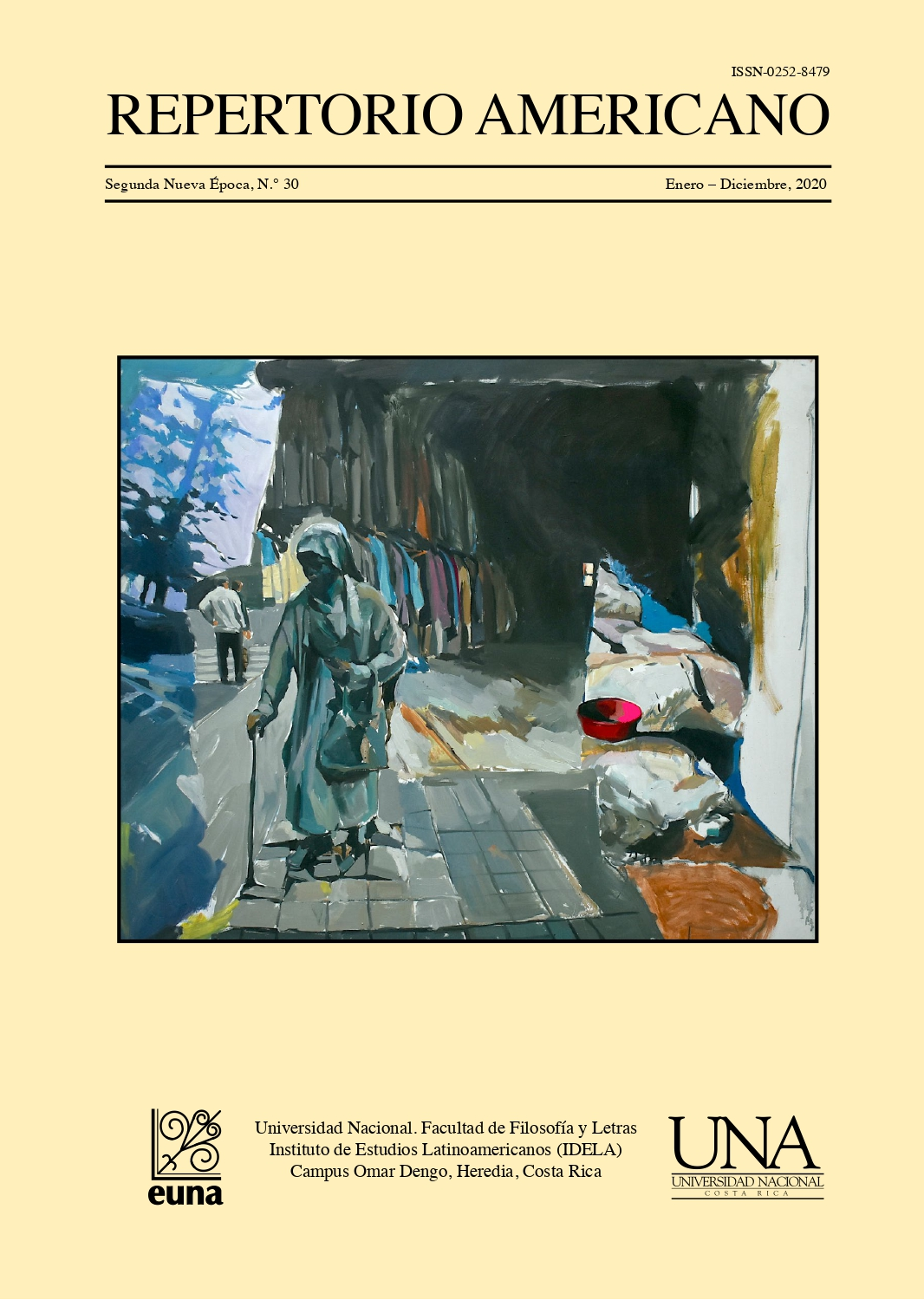Young female gamers: Their situation in the use of video games
DOI:
https://doi.org/10.15359/ra.1-30.10Keywords:
Videogames, women, Videogame Studies, Latin American Studies, Female playersAbstract
Research on video games is presented as a current, innovative and constantly developing space. In order to explore video games from a Latin American and gender-based perspective to the discussion, this work focuses on proposing an initial analysis of the situation of young women players who participate in this activity either professionally or casually. This article is based on an exhaustive review of scientific articles and audiovisual productions related to this topic. The results have been divided into four subcategories: exclusion and gender stereotypes; gamer identity; participation of women in e-sports and women competitors in professional and casual teams and reception of the male hegemonic speech. Finally, some reflections and questions are discussed by the researchers, which aim to provide possible study routes in Latin American and local studies of video games.
References
Alvarado, I. (2018). El legado de la programación. In M. Amores (Ed.), ¡Protesto! Videojuegos desde una perspectiva de género. Anait Games.
Amores, M., Trivi, M. (2020). Mujeres en
desarrollo de videojuegos. Youtube.
Amores, M. (2015). Hombres + Videojuegos. Youtube. https://youtu.be/
bGOvepwEsEI
Amores, M. (2018). Sobre la necesidad de
un libro de videojuegos con perectiva de género. In M. Amores (Ed.),
¡Protesto! Videojuegos desde una
perspectiva de género (pp. 13–38).
Anait Games.
Anderson, C. A., & Murphy, C. R. (2003).
Violent Video Games and Aggressive Behavior in Young Women. Aggressive Behavior, 29(5), 423–429.
https://doi.org/10.1002/ab.10042
Ansari, R., Jaffar, B. A., Riaz, S., Kaur, M.
J., & Mushtaq, A. (2019). Datamining to Alert the Formation of Women Objectification Stereotypes in
Video Games. Proceedings - 2019
Amity International Conference on
Artificial Intelligence, AICAI 2019,
February, 521–526. https://doi.
org/10.1109/AICAI.2019.8701256
Behm-Morawitz, E. & Mastro, D. (2009).
The effects of the sexualization of
female video game characters on
gender stereotyping and female
self-concept. Sex Roles, 61(11–12),
–823. https://doi.org/10.1007/
s11199-009-9683-8
Blackburn, G. & Scharrer, E. (2019).
Video Game Playing and Beliefs
about Masculinity Among Male and
Female Emerging Adults. Sex Roles, 80(5–6), 310–324. https://doi.
org/10.1007/s11199-018-0934-4
Botella, A. G. & Meseguer Navarro, M.
J. (2018). Análisis de los recursos
humanos implicados en la industria
de videojuegos y su entorno. Universitat Jaume I.
Breuer, J., Kowert, R., Festl, R. & Quandt, T. (2015). Sexist games=sexist gamers? A longitudinal study on the relationship between video game use
and sexist attitudes. Cyberpsychology, Behavior, and Social Networking, 18(4), 197–202. https://doi.
org/10.1089/cyber.2014.0492
Canales Cerón, M. (2006). Metodologías de
investigación social. Lom Ediciones.
Carr, M. (2010). Is gender stereotyping
having an adverse effect on career choices in the video/ computer games industry? University of
Huddersfield.
Corona, A. (2019). ¿Vestuario o agencia?
Representación de género en cinco
videojuegos de acción de la séptima generación. Anagramas - Rumbos y Sentidos de La Comunicación, 17(34), 155–175. https://doi.
org/10.22395/angr.v17n34a8
Cullen, A. L. L. (2018). “I play to win!”:
Geguri as a (post)feminist icon in
esports. Feminist Media Studies,
(5), 948–952. https://doi.org/10.1
/14680777.2018.1498112
Díaz, N. (2018). Los esports y la mujer:
relato de una experiencia. In M.
Amores (Ed.), ¡Protesto! Videojuegos desde una perspectiva de género. Anait Games.
Driesmans, K., Vandenbosch, L. & Eggermont, S. (2015). Playing a Videogame with a Sexualized Female
Character Increases Adolescents’
Rape Myth Acceptance and Tolerance Toward Sexual Harassment.
Games for Health Journal, 4(2),
g4h.2014.0055
Eriksson, M. (2011). Textual Differences
in Game Reviews Written by Men
and Women. Dalarna University.
Fox, J., Ralston, R. A., Cooper, C. K. & Jones, K. A. (2015). Sexualized Avatars Lead to Women’s Self-Objectification and Acceptance of Rape Myths. Psychology of Women Quarterly, 39(3), 349–362. https://doi.
org/10.1177/0361684314553578
Giaccardi, S., Ward, L. M., Seabrook,
R. C., Manago, A. & Lippman, J.
(2016). Media and Modern Manhood: Testing Associations Between Media Consumption and
Young Men’s Acceptance of Traditional Gender Ideologies. Sex Roles, 75(3–4), 151–163. https://doi.
org/10.1007/s11199-016-0588-z
Gitelman, E. R. (2014). Beyond Princess
Peach: Gender Issues And The Boy’s Club Hegemony Of Video
Game Development. The School of
the Art Institute of Chicago.
Gómez, D. (2018). La figura de la mujer en
la publicidad. In M. Amores (Ed.),
¡Protesto! Videojuegos desde una
perspectiva de género. Anait Games.
González-Sancho, R. (2014). Análisis de
la imagen de Latinoamérica en la
industria de los videojuegos. Universidad Nacional.
Gurdián-Fernández, A. (2007). El paradigma cualitativo en la investigación socio-educativa. Coordinación
Educativa y Cultural Centroamericana (CECC) y Agencia Española de
Cooperación Internacional (AECI).
Harvey, A. & Fisher, S. (2014). Everyone
can make games!: The post-feminist
context of women in digital game
production. Feminist Media Studies,
(4), 576–592. https://doi.org/10.1
/14680777.2014.958867
Heckmann, P. L. & Furini, L. (2018). The
introduction of women’s teams in
FIFA 16 and how Brazilian women
reacted to it. Estudos Em Comunicacao, 1(26), 247–260. https://doi.
org/10.20287/ec.n26.v1.a14
Hutt, R. (2020). Women in video games : ‘
Accept it , or don ’ t buy the game
’. World Economic Forum. https://
www.weforum.org/agenda/2018/06/
women-in-video-games-accept-itor-don-t-buy-the-game/
Inga Pajares, S. E. (2019). Motivación
hacia la práctica de videojuegos
online : Un estudio cualitativo en
mujeres universitarias. Universidad
Peruana de Ciencias Aplicadas.
Jones, C. M., Scholes, L., Johnson, D.,
Katsikitis, M. & Carras, M. C.
(2014). Videogames: Dispelling
myths and tabloid headlines that
videogames are bad. Proceedings
of the 28th International BCS Human Computer Interaction Conference: Sand, Sea and Sky - Holiday
HCI, HCI 2014, 52–61. https://doi.
org/10.14236/ewic/hci2014.6
Kaye, L. K. & Pennington, C. R. (2016).
“Girls can’t play”: The effects of
stereotype threat on females’ gaming performance. Computers in
Human Behavior, 59(May 2018),
–209. https://doi.org/10.1016/j.
chb.2016.02.020
Kowert, R., Breuer, J. & Quandt, T.
(2017). Women Are From FarmVille, Men Are From ViceCity: The
cycle of exclusion and sexism in
video game content and culture. In
R. Kowert & Q. Thorsten (Eds.),
New Perspectives on the Social
Aspects of Digital Gaming: Multiplayer 2 (1st ed., Issue January, pp.
–220). Routledge. https://doi.
org/10.4324/9781315629308-9
Legerén-Lago, B. (2012). Las chicas Son
guerreras (Universidad de Vigo
(ed.); pp. 1–12). Universidad de
Vigo. https://www.researchgate.net/
publication/280921042_Las_chicas_son_Guerreras_Las_mujeres_
como_consumidoras_de_videjuegos
Lopez-Fernandez, O., Jess Williams,
A., Griffiths, M. D. & Kuss, D. J.
(2019). Female gaming, gaming
addiction, and the role of women
within gaming culture: A narrative literature review. Frontiers in Psychiatry, 10(JULY), 1–14. https://
doi.org/10.3389/fpsyt.2019.00454
Manzano-Zambruno, L. & Paredes-Otero, G. (2019). El periodismo de
videojuegos desde una perspectiva feminista y de género: Las
periodistas especializadas ante el
acoso y la discriminación en españa dentro de las redes sociales.
In U. de Sevilla (Ed.), III Congreso Internacional Move.net sobre Movimientos Sociales y TIC
(pp. 84–98). Compoliticas. https://
www.academia.edu/43487562/
El_periodismo_de_videojuegos_desde_una_perspectiva_
feminista_y_de_género._Las_periodistas_especializadas_ante_el_
acoso_y_la_discriminación_en_España_dentro_de_las_redes_sociales
Martins, N., Williams, D. C., Harrison, K.,
& Ratan, R. A. (2009). A content
analysis of female body imagery in
video games. Sex Roles, 61(11–12),
–836. https://doi.org/10.1007/
s11199-009-9682-9
Mateo, M., Phillip., P.-T., Santoro, M.,
Luzardo, A., De Azevedo, B., Funes, G., Pison, J. P., & Becerra
Luna, L. (2019). Los videojuegos
no son un juego: Los desconocidos
éxitos de los estudios de América
Latina y el Caribe.
McCullough, K. M., Wong, Y. J., & Stevenson, N. J. (2020). Female Video
Game Players and the Protective
Effect of Feminist Identity Against
Internalized Misogyny. Sex Roles, 82(5–6), 266–276. https://doi.
org/10.1007/s11199-019-01055-7
McLean, L., & Griffiths, M. D. (2018). Female Gamers’ Experience of Online
Harassment and Social Support in
Online Gaming: A Qualitative Study. International Journal of Mental Health and Addiction, 17(4),
–994. https://doi.org/10.1007/
s11469-018-9962-0
Méndez Martínez, A. (2017). Las mujeres
y la creación en la industria de los
videojuegos en España: Oportunidades y dificultades en espacios
masculinizados. Investigaciones
Feministas, 8(2), 545–560. https://
doi.org/10.5209/infe.54912
Oates, B. A. (2020). Gender Roles and Expectations as a Part of the ‘ Gamer ’
Identity and Experience.
Paaßen, B., Morgenroth, T. & Stratemeyer,
M. (2017). What is a True Gamer?
The Male Gamer Stereotype and the
Marginalization of Women in Video
Game Culture. Sex Roles, 76(7–8),
–435. https://doi.org/10.1007/
s11199-016-0678-y
Paz Rodríguez, L. de la (2019). La imagen
y el rol de la mujer en los videojuegos: Desafíos ante estereotipos, rechazos y discriminaciones [Universidad de Valladolid]. http://uvadoc.
uva.es/handle/10324/37376
Pérez Holguín, N. F. (2019). Dimensión comunicativa y semiótica de Horizon
Zero Dawn. Aplicación etnográfica
a cuatro adolescentes jugadores de
videojuegos del norte de Bogotá.
[CORPORACIÓN UNIVERSITARIA MINUTO DE DIOS- UNIMINUTO]. https://doi.org/10.1017/
CBO9781107415324.004
Rautiainen, M. (2015). Gender, identity
and representation in video games: an elective discourse-oriented
course for Finnish EFL upper secondary school students. (Issue August). University of Jyväskylä.
Reynolds, D. (2014). Letters and the unseen woman: Epistolary architecture in three recent video games. Film
Quarterly, 68(1), 48–60. https://doi.
org/10.1525/FQ.2014.68.1.48
Ricoy, M. C. & Ameneiros, A. (2016).
Preferencias, dedicación y problemáticas generadas por los videojuegos: Una perspectiva de género.
Revista Complutense de Educacion, 27(3), 1291–1308. https://doi.
org/10.5209/rev_RCED.2016.v27.
n3.48445
Ruberg, B. (2018). Representing sex workers in video games: feminisms,
fantasies of exceptionalism, and the
value of erotic labor. Feminist Media
Studies, 19(3), 313–330. https://doi.or
g/10.1080/14680777.2018.1477815
Sun-Higginson, S. (2015). GTFO:the movie. Filmbuff.
Torres, C., Cuervo, R. & Flórez, J. (2019).
Co-diseño , videojuegos , y acoso
sexual. Poder violeta , un estudio de
caso. Diseño y Creación, 201–206.
Trépanier-Jobin, G. (2017). Introduction:
Gender Issues in Videogames. Kinephanos Revue d’etudes Des Médias et de Culture Populaire, 1–11.
Trépanier-Jobin, G. & Bonenfant, M.
(2017). Bridging Game Studies
and Feminist Theories. Kinephanos
Revue d’etudes Des Médias et de
Culture Populaire, Special Issue,
–53.
Trivi, M. (2018a). El futuro es femenino;
el pasado no tanto: Un repaso a la
historia de las mujeres en los videojuegos. In M. Amores (Ed.), ¡Protesto! videouegos desde una perspectiva de género. Anait Games.
Trivi, M. (2018b). Historia de las mujeres en
los videojuegos. In M. Amores (Ed.),
¡Protesto! Videojuegos desde una
perspectiva de género. Anait Games.
Tur, J. (2018). Masculino por defecto. In
M. Amores (Ed.), ¡Protesto! Videojuegos desde una perspectiva de género. Anait Games.
Published
How to Cite
Issue
Section
License
Las cartas de entendimiento se facilitarán a las personas autoras al momento de aceptación de su trabajo para publicarse.
Todos los contenidos son de libre acceso con sólo citar la fuente.







